Your in the right here. He doesn't have a legal foot to stand on and after everything is said and done he will be the one paying the lawyer fees on both sides for this. It's his burden of proof to prove your father of unsound mine, line up your ducks get the lawyer who wrote up the will and inform them about what is going on. They will have had recordings and witnesses that can testify to your father's faculties. Also any correspondence you might have between your father and brother that proves the schism between them will help your case.
My Dad Left Me His Inheritance—Then My Estranged Half-Brother Came Knocking
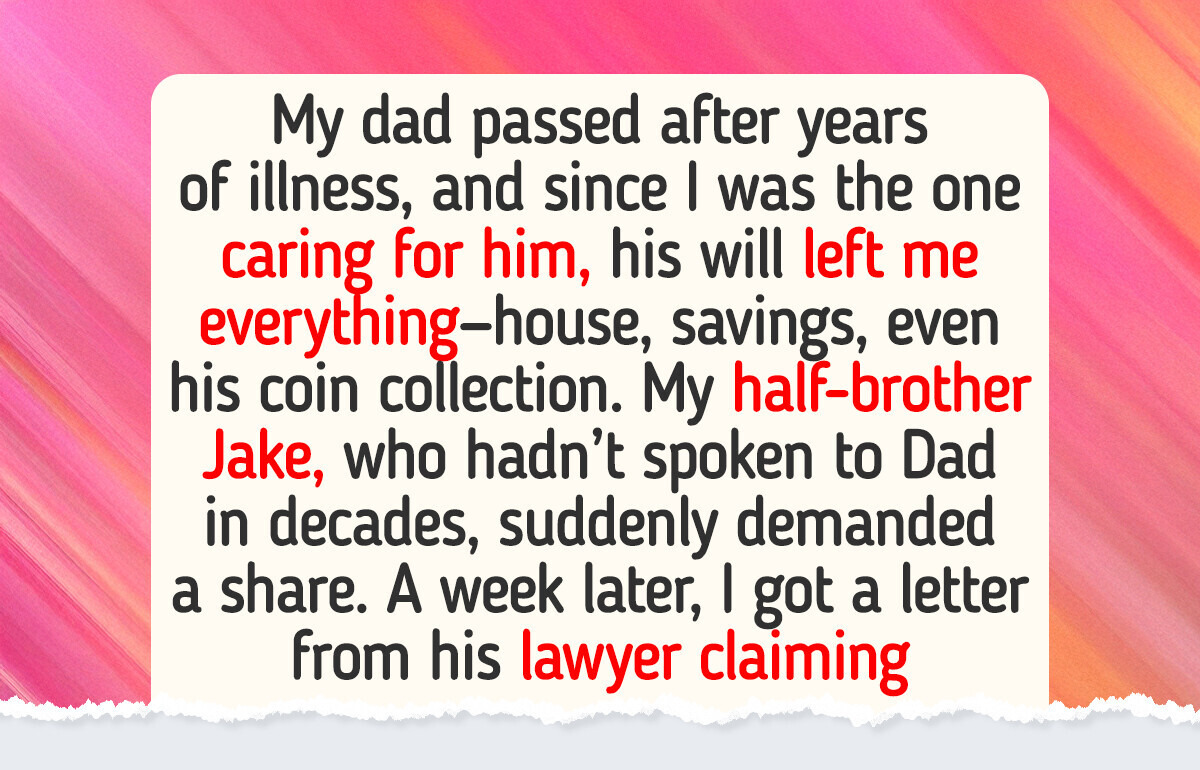
Inheriting from a parent can stir up complicated emotions—but what happens when long-lost family resurfaces at the very moment you’re trying to move forward? One reader shared how her father’s final gift was suddenly overshadowed by an estranged half-brother who showed up.
This article is intended for entertainment purposes only. We make no representations or warranties regarding the completeness, accuracy, reliability, or safety of the content provided. Any actions taken based on the information in this article are strictly at the reader’s own risk. We assume no responsibility or liability for any loss, damage, or consequences arising from the use of this content. Readers are advised to exercise their own judgment, take appropriate precautions, and seek professional guidance if attempting to replicate any part of the content.
Her letter

Hi Bright Side!
So, my dad passed a few months ago. Not unexpected — he’d been sick for years. I was the one running him to every doctor’s appointment, buying groceries, sitting with him on the rough nights. My siblings? Nowhere.
When the will was read, Dad left everything to me. The house, savings, even his prized coin collection. He always told me this was the plan because I was the one actually there for him.
Enter my half-brother (let’s call him “Jake”), who I’ve maybe seen twice in my life. He hadn’t spoken to Dad in decades. Suddenly, he shows up demanding “his share,” saying blood entitles him to half. I told him no — Dad made his wishes clear.
Jake blew up. Called me selfish, sent me guilt-trip texts like “Do you really think Dad wanted to cut me out?” Then he stopped messaging me directly.
A week later, I get a letter. From his lawyers. He’s actually trying to contest the will, claiming Dad “wasn’t of sound mind” when he signed it. My stomach dropped. This guy who vanished for decades is now trying to drag me through court for the inheritance.
My extended family is split — half say I should “just share to avoid drama,” the other half tell me not to give in because this is exactly what Dad wanted.
Now I’m stuck between fighting it out legally or caving just to make it stop. So, am I wrong for holding firm to what Dad left me, or is Jake crossing the ultimate line here?
Maria
Thank you, Maria, for sharing with us and our readers!
Contesting a Will: What You Should Know.

Disagreements over inheritance can be heartbreaking — and complicated. Here’s a simple breakdown of what it means to contest a Will, who can do it, and how the process works.
What Does “Contesting a Will” Mean?
It’s when someone legally challenges a Will’s validity or the way the estate is divided.
Usually, this happens if the Will doesn’t reflect the deceased’s true wishes or seems unfair to dependents.
Common reasons include undue influence, lack of mental capacity, forgery, or fraud.
Grounds for Contesting
A Will can be challenged if there’s evidence of:
Lack of capacity — the person making the Will didn’t fully understand what they were doing (e.g. dementia).
Invalidity — the Will wasn’t written, signed, or witnessed properly.
Undue influence or duress — someone pressured the deceased into changing their Will.
Fraud or forgery — the signature or document itself was faked.
Financial dependency — dependents not included may still be entitled to support under the Inheritance Act (strict 6-month time limit applies).
Contesting a Will is possible, but it’s complex and emotionally draining. The best way to protect loved ones is to leave a clear, valid, and updated Will.
Steps You Can Take Now.
1. Find a local probate lawyer
Don’t handle this alone — you need a solicitor or attorney who specializes in contested Wills. They’ll assess your case, explain your rights, and guide you through deadlines.
2. Gather evidence
This may include:
Medical records from the time of signing the Will
Witness statements (neighbors, doctors, the drafting lawyer)
Previous Wills, letters, or written notes by the deceased
3. Be aware of strict time limits
Most jurisdictions set deadlines (often 6 months from probate being granted) to contest or defend a Will. Exceptions exist, but acting quickly is key.
4. Take care of yourself
Fighting a Will while grieving is exhausting. Therapy, support groups, or trusted friends can help you stay grounded.
5. Act quickly
Contesting a will after probate has been granted is possible, though it is always preferable to raise a claim beforehand.
In the end, the inheritance wasn’t just about money — it was about loyalty, absence, and who really shows up when it matters most.
I’m Child-Free, and My Parents Chose to Leave Their Legacy to My Cousin—So I Turned the Tables
Comments
Related Reads
My Parents Forced Me to Babysit My Siblings, Now I Served Them a Cold Revenge
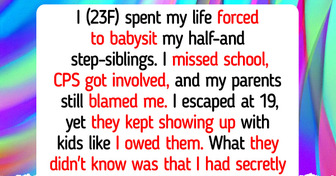
I Chose My Stepmom Over My Mom in the Delivery Room, Now Everyone Hates Me
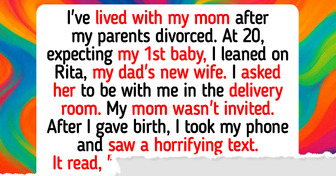
I Refuse to Bail My Brother Out of Trouble, He’s Not My Problem

My Son Sued Me Over His Inheritance—And the Judge’s Ruling Left Us Both in Tears

I Refuse to Be Forgotten After Raising My Stepson for 14 Years
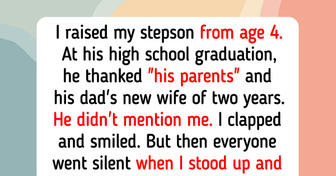
14 Mother-in-Law Moments That Became a Legendary Family Story
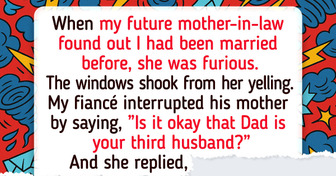
20+ Dads Who Prove That Actions Speak Louder Than Words

15+ People Who Found Out Their Partner Was Living a Lie
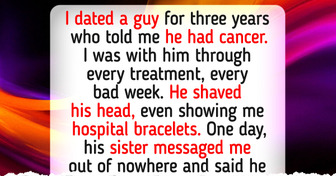
I Refused to Break My Back Over My Stepchild’s Medical Emergency
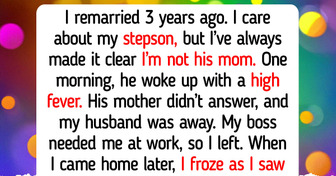
My Ex’s New Girlfriend Crossed a Line With My Kids, So I Revealed Her Secret

I Refuse to Sell My Family Home So My DIL Can Buy Her Dream House
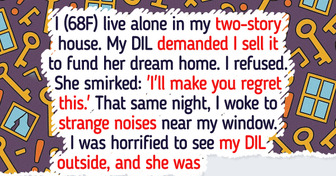
My Sister Forbade My Wheelchair at Her Wedding—She Wasn’t Ready for My Payback
